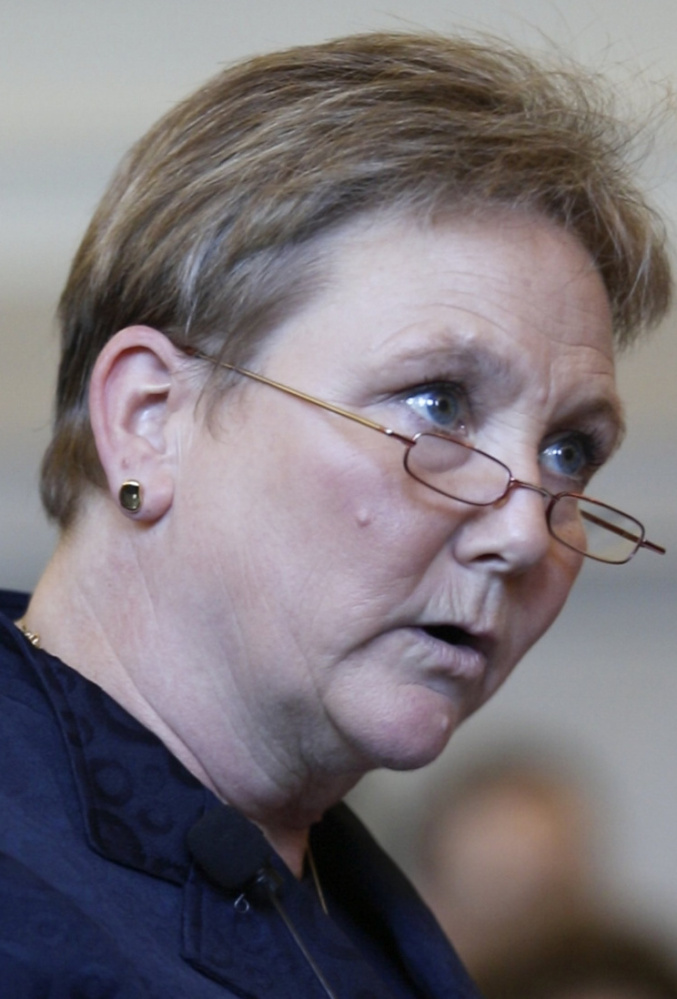Legislators and key witnesses will have lawyers at the ready when the Government Oversight Committee convenes Thursday for a hearing on Gov. Paul LePage’s intervention in a private school’s decision to offer a job to House Speaker Mark Eves.
Two members of LePage’s staff who were subpoenaed to testify will be represented by a Portland lawyer, whose fee will be picked up by Maine taxpayers. Meanwhile, the committee has been huddling with the state Attorney General’s Office for advice on how to handle potential obstructions, including the possibility that Cynthia Montgomery, the governor’s legal counsel, and senior aide Aaron Chadbourne refuse to answer lawmakers’ questions.
Chadbourne and Montgomery originally declined to voluntarily appear, but agreed to attend after the committee voted Oct. 15 to subpoena them. The highly anticipated hearing will include seven other witnesses who were not subpoenaed.
LePage has acknowledged that he threatened to withhold $530,000 in state funding for Good Will-Hinckley, a nonprofit organization in Fairfield that runs educational programs for at-risk students, unless it withdrew an offer to hire Eves as its next president. The organization operates the Maine Academy of Natural Sciences, a charter school, and LePage said Eves was a poor choice to lead the school because he lacks qualifications and has opposed charter schools in the Legislature.
Rep. Chuck Kruger, D-Thomaston, a co-chairman on the committee, said he believes Chadbourne and Montgomery will respond to lawmakers’ questions. Nonetheless, the panel has consulted with Assistant Attorney General Linda Pistner to prepare for the possibility that they won’t. Pistner provides legal advice to the committee and the watchdog agency it oversees, the Office of Program Evaluation and Government Accountability.
Some LePage critics hope the inquiry will lead to the governor’s impeachment. LePage has dismissed the inquiry as a witch hunt and also has called for Augusta Republican Sen. Roger Katz’s recusal as co-chairman of the committee. Montgomery has argued that the governor couldn’t be investigated by OPEGA.
Kruger said the purpose of the inquiry isn’t to establish wrongdoing, but to obtain facts surrounding a controversy that erupted when Good Will-Hinckley rescinded its job offer to Eves in June. Since then, OPEGA has published a 25-page report that confirmed the potential loss of state funding led to the organization’s decision.
The oversight panel also has interviewed Jack Moore, chairman of the board for Good Will-Hinckley. Moore said the governor’s threat jeopardized the school’s solvency and forced it to terminate its contract with Eves, even though the board believed Eves was qualified and voted unanimously to offer him the job.
Kruger said the move to subpoena Chadbourne and Montgomery was designed to tie up several loose ends in the OPEGA report.
“We are happy we can now get some clarity from questions that arose from the report and the other facts that are out there,” he said. “We appreciate (Chadbourne and Montgomery) coming to talk to us.”
Kruger added, “I don’t think anybody is out to hide the facts. The sooner we have our questions answered, the sooner we can wrap it up.”
Under state law, certain legislative committees have subpoena power to compel witnesses to appear. If a witness refuses, the committee can turn to the state court system to enforce the subpoena, raising the prospect of a contempt charge.
Cliff Ruprecht, a Portland attorney hired by the administration to represent Chadbourne and Montgomery, said his clients will answer questions relevant to OPEGA’s inquiry.
“I would certainly hope that they ask appropriate questions,” he said.
There may be disagreements between Ruprecht and lawmakers about what’s relevant or appropriate. Both sides already have disagreed about the committee’s power to subpoena the LePage staffers.
In a Nov. 2 letter to the committee, Ruprecht disputed its ability to compel Chadbourne and Montgomery to testify.
“Neither they nor the Office of the Governor concedes the validity of the committee’s subpoenas, but since they have chosen to appear, they will not be moving to quash the subpoenas,” Ruprecht wrote.
He said Thursday’s testimony will “yield little new information relevant to OPEGA’s work” and noted that both LePage officials offered to respond to written questions.
“Unfortunately, certain members are now suggesting that the Office of the Governor was hiding something when it offered to cooperate that way. That is simply untrue,” Ruprecht wrote.
Republican members of the oversight committee may focus on another witness, Bill Brown, an Eves aide in the House speaker’s office who also serves as board chairman for the Maine Academy of Natural Sciences, the charter school at Good Will-Hinckley. The OPEGA report found LePage was convinced that Eves’ hiring was cronyism when he learned of Brown’s involvement with the school.
The remaining witnesses include officials in the Department of Education who would have been involved in disbursing funds to Good Will-Hinckley; two lobbyists for the school; and Greg Powell, chairman of the board of the Harold Alfond Foundation, a philanthropic nonprofit that provides a $2.7 million grant to the school.
School board members voted to withdraw the job offer to Eves after the foundation expressed concerns about the financial impact of LePage’s threat to kill the state’s funding.
Eves has filed a lawsuit against LePage alleging that he violated Maine’s tort claim law by intimidating Good Will-Hinckley, and used taxpayer money and the power of his office to reverse the school’s hiring of Eves.
Send questions/comments to the editors.





Comments are no longer available on this story